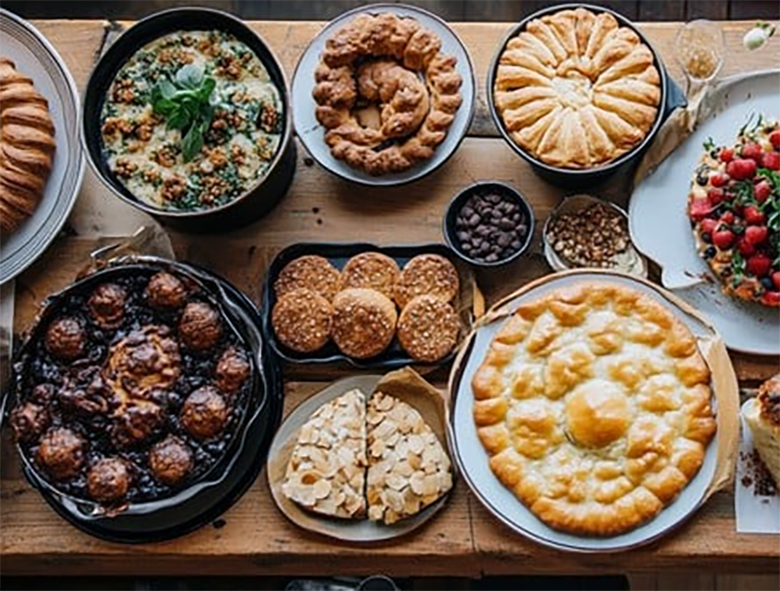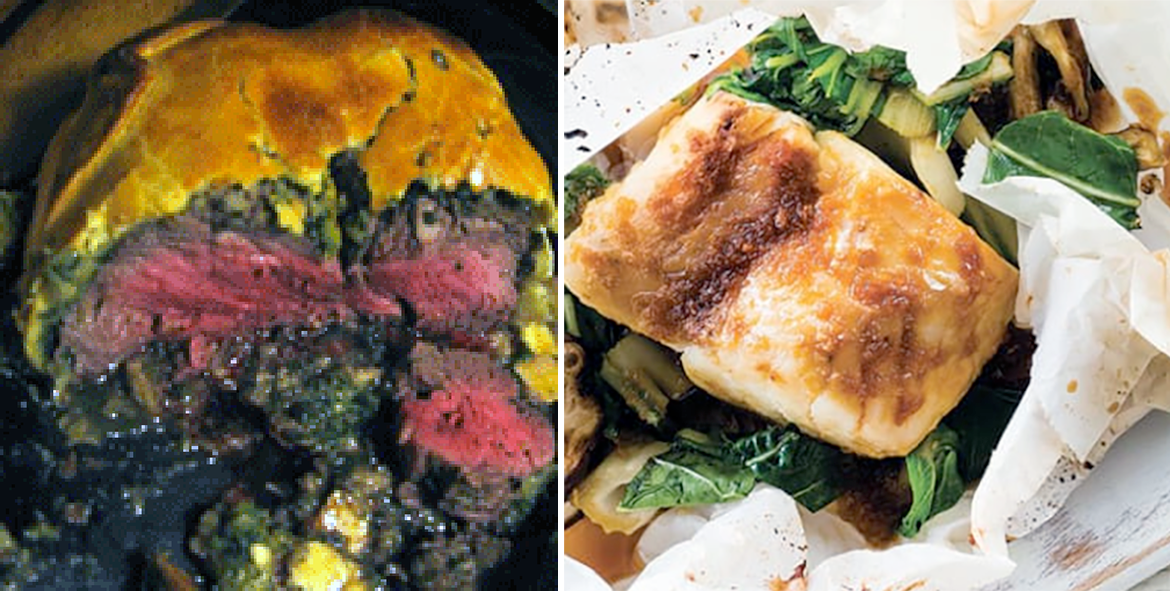FabulousFusionFood's Baking Recipes 20th Page
 A range of baked goods.
A range of baked goods.
Welcome to FabulousFusionFood's Baking Recipes Page — This is a continuation of an entire series of pages that will, I hope, allow my visitors to better navigate this site. As well as displaying recipes by name, country and region of origin I am now planning a whole series of pages where recipes can be located by meal type and main ingredient. This page gives a listing of all the baking recipes added to this site. Baking is defined as a technique for the prolonged cooking of food using dry heat by the action of conduction. Baking is normally done in an oven, but goods may also be baked in hot ashes or on hot stones. Baking differs from Roasting Recipes in that a lower temperature is typically used and the items are cooked for a longer period of time. Baking is a much older process than most people think and foods were probably originally baked in embers or with hot stones (which is how bread may have started). Only later did specialist ovens develop. Though most baked goods tend to be bread or cake-based some other dishes such as pasta dishes and vegetable dishes may also be baked. Stews are often also technically baked in an oven, but are not classed as 'baked goods' in that they are more liquid than solid at the end of the cooking process.
Baking is a method of preparing food that uses dry heat, typically in an oven, but can also be done in hot ashes, or on hot stones. The most common baked item is bread, but many other types of foods can be baked. Heat is gradually transferred "from the surface of cakes, biscuits and cookies, and pieces of bread to their centre, typically conducted at elevated temperatures surpassing 150°C. Dry heat cooking imparts a distinctive richness to foods through the processes of caramelization and surface browning. As heat travels through, it transforms batters and doughs into baked goods and more with a firm dry crust and a softer centre. Baking can be combined with grilling to produce a hybrid barbecue variant by using both methods simultaneously, or one after the other. Baking is related to barbecuing because the concept of the masonry oven is similar to that of a smoke pit.
In addition to bread, baking is used to prepare cakes, pastries, pies, tarts, quiches, biscuits and cookies, scones, crackers, pretzels, and more. These popular items are known collectively as 'baked goods', and are often sold at a bakery, which is a store that carries only baked goods, or at markets, grocery stores, farmers markets or through other venues.
 Beef en croûte (left) and fish en papillote (right).
Beef en croûte (left) and fish en papillote (right).
The alphabetical list of all the baking recipes on this site follows, (limited to 100 recipes per page). There are 2752 recipes in total:
Page 20 of 28
| Penzance Cake III Origin: England | Pitcairn Roasted Breadfruit Origin: Pitcairn Islands | Poisson Farci à la Saint-Louisienne (Stuffed Fish, in the Manner of St Louis) Origin: Senegal |
| Penzance Grey Mullet Origin: Cornwall | Pitcaithly Bannocks Origin: Scotland | Poke Origin: Cook Islands |
| Pepper Pasta Pie Origin: South Africa | Pitta Bread Origin: Middle East | Poke Origin: Tokelau |
| Pepperoni Pizza Origin: Italy | Pizza (Made Without Yeast) Origin: Argentina | Polenta Cake Origin: British |
| Perfect Pumpkin Pie Origin: American | Pizza alla Rustica Origin: Italy | Polka-Dot Corn Muffins Origin: American |
| Pesmol (Mackerel with Bell Pepper in a Coconut and Chilli Sauce) Origin: Indonesia | Pizza Base Dough Origin: Italy | Pollack Pie with Crushed Potato Topping Origin: Britain |
| Pesto Pastry Stars Origin: British | Pizza Calabrese (Calabrian Pizza) Origin: Italy | Polvorones de Canela (Cinnamon Shortbread) Origin: Spain |
| Petits Beurres Origin: France | Pizza Cordon Bleu Origin: France | Polvorones puertorriqueños (Guava Thumbprint Biscuits) Origin: Puerto Rico |
| Petits Gâteaux au Sureau (Elderberry Muffins) Origin: Switzerland | Pizza Napoletana Origin: Italy | Pom Origin: Suriname |
| Peynirli Bisküvi (Cheese Biscuits) Origin: Turkey | Pizza Quattro Stagioni (Four Seasons Pizza) Origin: Italy | Pomegranate and Vanilla Cupcakes Origin: Britain |
| Peynirli Künefe (Turkish Cheesecake) Origin: Turkey | Pizza Romana (Roman-style Cream Buns) Origin: Italy | Pommé Breton traditionelle (Traditional Breton Apple Cake) Origin: France |
| Phaphata (Fried Muffins) Origin: Botswana | Pizza Romana (Roman-style Cream Buns) Origin: Vatican City | Pône (Sweet Potato and Pumpkin Pound) Origin: Saint Barthelemy |
| Philadelphia-style Butter Cake Origin: American | Pizza Rustica (PItalian Easter Ham Pie) Origin: Italy | Poné de Cassave (Cassava Pone) Origin: French Guiana |
| Piña Colada Cupcakes Origin: Britain | Pizza Sauce Origin: Italy | Poné de Citrouille (Pumpkin Pone) Origin: French Guiana |
| Pie Crust Origin: Britain | Pizza Tonno e Cipolla (Tuna and Onion Pizza) Origin: Italy | Poné de Citrouille (Pumpkin Pone) Origin: Guyana |
| Pigeon Pie Origin: British | Placenta (Cato's Layered Cheesecake) Origin: Roman | Poppadoms Origin: India |
| Pigeons in a Hole Origin: British | Plain Naan Bread Origin: India | Poppy Seed and Blackberry Cake Origin: Ancient |
| Pilaf-Stuffed Onions Origin: Middle East | Plain Pound Cake Origin: Britain | Poppy Seed and Lemon Cheesecake (Poppy Seed and Lemon Cheesecake/title>) Origin: Britain |
| Pine Pollen Bread Origin: France | Plain Sponge Cake Origin: British | Poppy Seed Cake Origin: Britain |
| Pineapple and Carnation Fruit Cake Origin: Britain | Plantain Gingerbread Origin: Liberia | Poppy Seed Kolache Origin: Croatia |
| Pineapple and Cassava Tarts Origin: Philippines | Plantain Pie Origin: Dominica | Poppyseed Kolaches Origin: Czech |
| Pineapple Buns Origin: Hong Kong | Plum and Apple Tart Spiced with Herb Bennet Root Origin: Britain | Pork and Seaweed Pie with Potato Crust Origin: England |
| Pineapple Sage Pound Cake Origin: American | Plum Cake Origin: Britain | Pork and Veal Terrine Origin: Britain |
| Pineapple Upside-down Pudding Origin: British | Plum Crumble Origin: British | Pork Pasty Origin: England |
| Pineappleweed Biscuits Origin: Britain | Plum Muffins (Plum Muffins) Origin: Britain | Portakalli Kek (Orange Cake) Origin: Turkey |
| Pineappleweed Skolebrød Origin: Scotland | Plum Traybake Slices Origin: Britain | Porter Cake Origin: Northern Ireland |
| Pioniono de Arquipe y Coco (Dulce de Leche and Coconut Roll) Origin: Colombia | Plun (Banana) Pie Origin: Pitcairn Islands | Pot Bread Origin: Southern Africa |
| Piparkökur (Icelandic Pepper Biscuits) Origin: Iceland | Plun Pilhi (Green Banana Pilhi) Origin: Norfolk Island | Potato and Aubergine Layer Pie Origin: British |
| Piroshki Origin: Russia | Po'e Origin: Tahiti | Potato and Herb Terrine Origin: Ireland |
| Pisam Farsilem (Pressed Peas) Origin: Roman | Po'e Origin: Easter Island | Potato and Salmon Parcels Origin: Ireland |
| Pistachio and Yoghurt Cake Origin: Britain | Po'e (Fruit Pudding Cake) Origin: Easter Island | Potato Buns Origin: Ireland |
| Pistolette Roll Origin: American | Podin Lymmaval (Lemmon Pudding) Origin: England | Potato Cream Cake Origin: Britain |
| Pita Bread Origin: Turkey | Poisson aux Coco (Coconut Fish) Origin: Tanzania | |
| Pita Bread Origin: Tajikistan | Poisson aux Fines Herbes (Herbed Fish) Origin: Mauritius |
Page 20 of 28